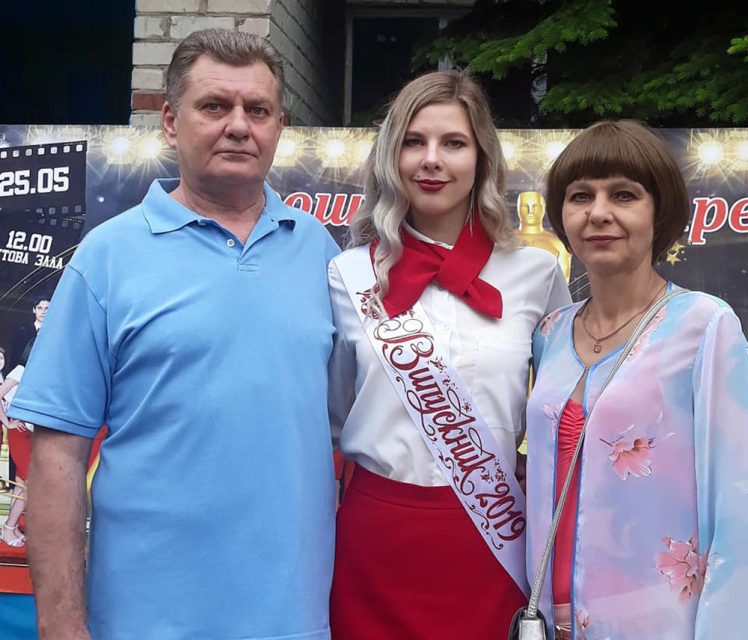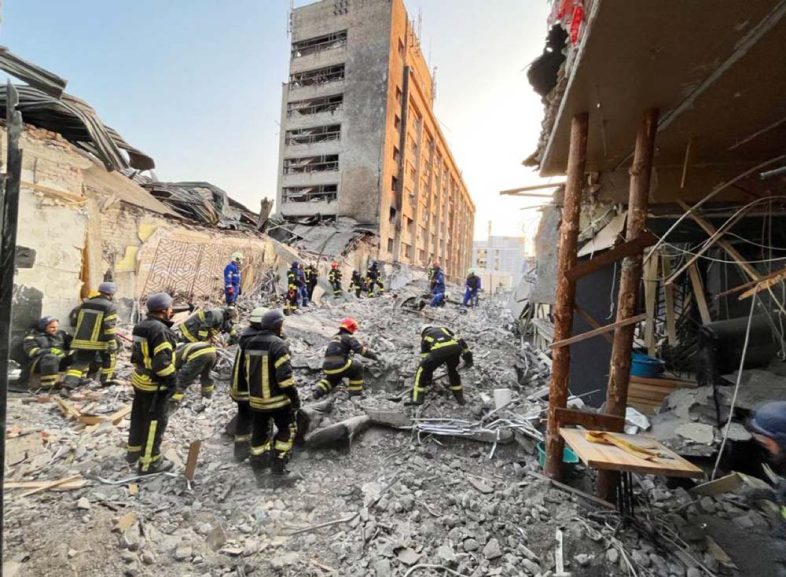This is the story of Valeria Isay, a girl from Kramatorsk, whose life was shattered by war not once but twice: first in 2014 and again in 2022. Her journey from childhood to adulthood, marked by the events around her, memories, and a deep longing for home, represents just one of the thousands of stories from Donetsk, where the war stole childhoods and forever altered the lives of countless children.
Explosions rumbled through her ears like thunder on a spring day. Kramatorsk shook under the relentless barrage as 12-year-old Valeria huddled in the corner of her childhood bed. Her world shattered into fragments amid the deafening roar of shells and explosions that battered the city. This was how war began for the young girl from Donetsk in April 2014—abruptly and mercilessly.
The shockwave hurled little Valeria into the air like a delicate toy. The world spun in a frenzied vortex of dust, smoke, and cries. Death seemed to roar in her ears. Yet, she clung desperately to her parents’ outstretched arms, fighting against her new, terrifying “acquaintance” with every ounce of her strength.
Soon, Valeria’s family made the decision to flee the nightmarish Kramatorsk as separatists and militants advanced. Valeria took a final, lingering look at her home, where she had nurtured dreams of a bright future, and at the school where she would never complete her studies that year. Her first report card with honours wasn’t awarded at a celebratory ceremony; instead, the news of her exceptional performance came in a flat, emotionless phone call from her class teacher.
Now, those dreams lay in ruins amid the bustling courtyards of Kramatorsk, and new accomplishments seemed hollow and insignificant. She bid a silent farewell to each street, unable to foresee what would become of her home in 2022. The urgency to leave fractured her heart, compelling her to gather all the small treasures she could salvage.
So, Valeria collected family photos, beloved toys that offered a semblance of comfort, books she had promised her mother she would read, birthday gifts from friends, and, most importantly, the keys to the home she had hoped to return to soon.
Their temporary refuge became Kyiv, where the family arrived in the spring of 2014, likely on the last train. The city’s streets met them with a harsh reality and cold, indifferent glances from strangers. Despite having escaped the immediate horrors of war in Kramatorsk, they were now faced with a new set of daunting challenges. The stress took a toll on Valeria, who gained weight and grew markedly more sombre. The ever-present smile that once brightened her face had vanished.
When asked about her memories of that summer, she could only respond, “I remember the sounds from the construction site that echoed the explosions in Kramatorsk. Those were the most terrifying nightmares of my life. And then there was nature… and that’s it. It feels like there was nothing else.”
Her childhood memories seemed to have erased the painful events, preserving only the faint hope of returning home.
Soon, Valeria’s mother’s illness began to worsen. The tumour, already weakened by years of chemotherapy, began to grow rapidly under the strain of the ongoing war. Within weeks, she was utterly debilitated, barely able to move around the house. She suffered through sleepless nights in a strange, new city, plagued by nightmares and haunted by memories of the Kramatorsk horrors of fire and iron. Doctors recommended immediate surgery before the tumour reached an incurable stage. Consequently, her parents travelled to Kharkiv, leaving twelve-year-old Valeria with relatives. Her hands trembled, cartoons no longer held her interest, and instead of dreams, she was tormented by nightmares, though she couldn’t understand why at the time. Even a decade later, Valeria recalls that parting with her parents at the station with a quivering voice:
“My mom and dad were smiling, but their eyes told a different story. They promised to return from Kharkiv in a few weeks. As it turned out, after those weeks, they didn’t come back to me in Kyiv but went to the occupied territory instead… They thought it was the best decision and a way to shield me from the harsh reality for a little longer.”

A photo with Valeria’s parents in Kramatorsk
After Kramatorsk was de-occupied on July 5, 2014, the family returned home and attempted to resume their normal lives. The city had managed to catch its breath somewhat after the gruelling battles. Valeria went back to school and started reconnecting with friends at the playgrounds. Slowly, the horrors of war faded into the background, giving way to the familiar, carefree attitude of adolescence.
However, in February 2015, the past came crashing back. Valeria slept in until noon, savouring her weekend rest until the piercing sound of rockets shattered her peace. She froze, her mind reliving the trauma of the previous year.
Valeria scrambled to the bathroom—the only safe haven in their cramped two-room apartment. Holding her breath, she listened as gunfire and explosions drew closer to her home. The bathroom trembled with each shockwave, and then came the horrifying, high-pitched wail of a rocket striking a neighbouring yard.
Without phone service, Valeria’s parents were unaware of her situation, and she had no information about them. Eventually, everyone returned home safely, but their neighbours soon arrived with tragic news: Halyna, a familiar face who lived in the nearby building and worked at the kindergarten Valeria had once attended, had been killed.
The war had cruelly reminded them of its relentless presence, rudely pulling Valeria out of her teenage reverie.
In the winter of 2022, war knocked on Valeria’s door once more. She had gone to Kharkiv to visit friends, cancelling all her plans at home, including a reservation for her birthday at Ria Pizza—the very place that would be hit by Russian forces on June 27, 2023, resulting in the death of renowned Ukrainian writer Viktoria Amelina. A blaring siren shattered the pre-dawn quiet, jolting Valeria awake. From her window, she saw a horrifying sight: flashes lighting up the night sky over Kharkiv. “Is this happening again?” she thought in despair. “Why is there no escape from this nightmare?”
Eight years earlier, war had arrived in Donbas, stripping Valeria of her childhood. Now, it loomed over her in Kharkiv, just one day before her twentieth birthday. The air outside was filled with a cacophony of explosions, gunfire, and the rumble of military machinery. Valeria clutched her mother’s ring tightly in her hand and waited. Once again, she was left alone with the war, reminiscent of those dark days of her distant childhood. But this time, there would be no one to rescue them. Her mother, Maryna Isay, had succumbed to a long, gruelling battle with cancer and metastases on January 29, 2020, when Valeria was seventeen. Her father and grandfather were far away in Kramatorsk at the time, unable to offer any help.

Valeria and her friends sought refuge in the basement of their building. For the next three days, they huddled in the cramped space, surviving on sparse student provisions. Soon, they ran out of food and water while the relentless shelling outside continued. The situation grew increasingly dire. In a desperate move, Valeria and her friends decided to attempt an escape from the city by car. They drove cautiously, weaving through barricades and debris. What would normally have been a three-hour drive stretched into an exhausting seven-hour ordeal, fraught with the constant threat of encountering Russian occupiers.
When Valeria finally arrived in her hometown of Kramatorsk, she was met with a scene of utter devastation. Bombed-out buildings, trenches, and checkpoints dotted every corner.
The familiar streets were now desolate and unwelcoming. Her favourite spots, Ria Pizza and SOVA, were shuttered, and the city was engulfed in chaos. The memories of choosing a birthday dress, picking a venue, and scheduling makeup and hair appointments felt like fragments of a distant, almost alien past. Her father greeted her with visible relief but quickly urged a move to the west, to the safer city of Lviv, where distant relatives awaited.
March 8, 2022, marked yet another day of escape for Valeria. On an evacuation train bound for Lviv, a journey that stretched over a gruelling day, she watched the ruins of Kharkiv and Kramatorsk recede into the distance through tear-filled eyes. The stark reality hit her: there was no home left to return to. As a refugee in a foreign land, Valeria faced the daunting task of starting over from scratch.

